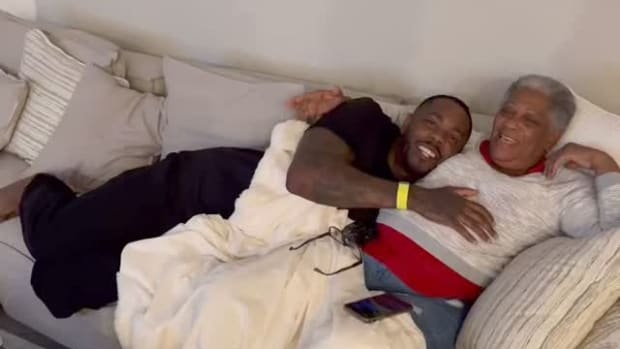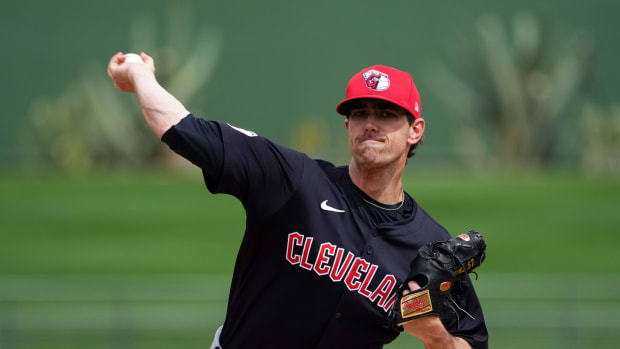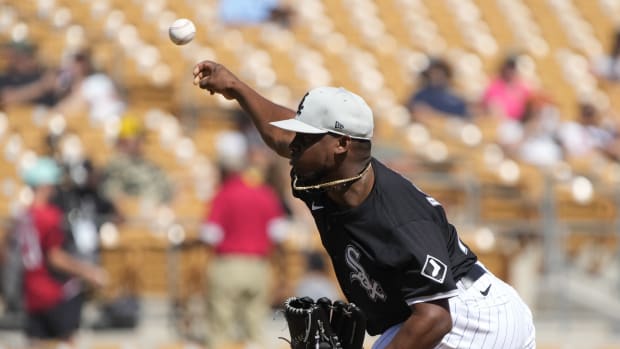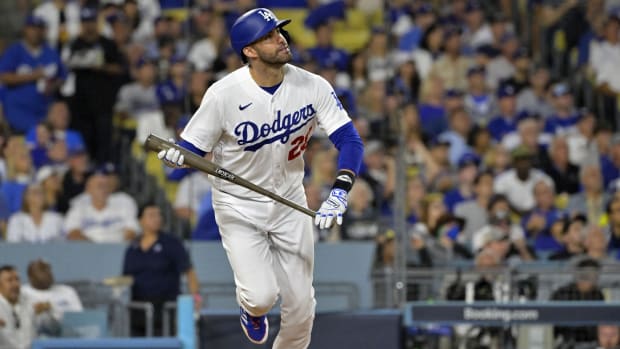The Padres’ Goose Is Almost Cooked as Chaos Strikes the NLCS
PHILADELPHIA — The pair of geese lay tilted on their sides. One rested on a table; the other had been set on the floor, propped up against the base of an unoccupied couch like a somber, listless footnote to the story of the visiting clubhouse.
It was hard to imagine the placement was intended as symbolic—this kind of loss allows little time for symbolism—but it was harder still not to notice it. The replica geese are representatives not just of the Padres’ playoff run, but specifically of the chaotic, spirited energy that drove their come-from-behind NLDS win over the Dodgers. (Which, of course, featured a real, live goose on the field.) That was the style of play that put them in the NLCS. And what happened in Game 4 on Saturday felt like a complete inversion of that principle for San Diego.
There was chaotic, spirited energy here, all right. But it ultimately went against the Padres. After a 10–6 loss that saw the teams combine for 13 pitchers, two ties and one wild lead change, the season is on the brink for San Diego. The metaphorical goose may not be cooked just yet. But its literal equivalents are laid out in the visitors’ clubhouse at Citizens Bank Park.
“It’s not how we planned it out,” said Padres catcher Austin Nola. “It’s just—we’ve got to do a better job all around in every facet of the game.”
This one felt off the rails from the start. Neither starter made it out of the first inning. No pitcher faced more than nine batters. There was a weird, memorable bounce of a ball off second base, and no lead ever felt safe. But while Philadelphia found a way to lean into this frenzy—simply adding one home run after another—San Diego did not.
A few days after the Padres had to come back from a four-run deficit to notch their first win in this series, they blew a four-run lead of their own. Then grabbed the lead back. Then lost it for good. The game was a show of force by this offense, but in the end, it simply wasn’t enough.
“If you told me we're going to score six runs tonight,” San Diego manager Bob Melvin said afterward, “I'd probably think we have a pretty good chance to win the game.”
Indeed. And yet!
This had always been intended as a bullpen game for both sides—though with the expectation that each starter could try for at least two or three innings. It became clear almost immediately that expectation would not be met. The Padres jumped all over Phillies starter Bailey Falter in the top of the first, beginning with a home run from third baseman Manny Machado, which helped build a 4–0 first-inning lead.
But the bottom of the frame felt like a distorted reflection of the top.
Falter, at least, had been able to record two outs before getting pulled. Padres starter Mike Clevinger could not retire a single batter—giving up a home run to Rhys Hoskins and an RBI double to Bryce Harper. Though San Diego righty Nick Martinez was able to stop the damage there, the Padres’ lead had been cut to 4–3, and they would not be able to hold it for long.
“It’s probably one of the worst days of my life,” Clevinger said. “That pretty much sums it up. It sucks.”

Clevinger allowed three runs in the first inning and was removed before he could record an out during his NLCS Game 4 start.
Kyle Ross/USA TODAY Sports
Clevinger has been pitching through a knee injury this season and said he did not want to use that as an excuse. (“I think he had a good week,” Melvin said of Clevinger’s leadup to this start. “He's been battling stuff all year. I think he felt good going into that game.”) But it was clear that he did not have anything close to his best stuff on Saturday.
As bad as that was, however, it did not necessarily have to be damning. Except San Diego couldn’t stop the Phillies from scoring. Philadelphia tied it at four in the fourth on Bryson Stott’s RBI single. After the Padres jumped right back ahead with a Juan Soto two-run shot in the fifth, the bottom of the inning saw them lose the lead again—with another home run from Hoskins—and still more home runs followed in the sixth (Kyle Schwarber) and seventh (J.T. Realmuto). The Phillies’ bullpen locked it down. The Padres’ could not stop leaking.
“We tried to hold that ground, and we just couldn’t hold it,” Machado said.
If there is a silver lining here for the Padres, it is that they did not have to use their best relievers, given how quickly the game got out of hand in the middle innings. Josh Hader, Robert Suárez and Tim Hill were left untouched on Saturday—and if San Diego wants to extend this series by more than one day, all three will surely see heavy use in the games to come.
The flip side, of course, is that the same is true of the Phillies. While they did bring out David Robertson and Zach Eflin, they did not have to use their two best relievers, José Alvarado or Seranthony Domínguez. That pair split the last three innings of Game 3, and ensuring a day of rest for them before they look to close out the series tomorrow is huge.
The result is an uphill climb for the Padres. They will have Yu Darvish on the mound Sunday to face off against Phillies ace Zack Wheeler, who dominated this team in Game 1, striking out eight in seven shutout innings.
A loss will end their season. A victory will bring the series back to San Diego—geese, presumably, in tow.
“We only need to win one to get home,” Melvin said. “That’s what we’re concerned about tomorrow is winning one game. We have Yu on the mound. We have our best relievers available for multiple innings tomorrow. And our focus is to win one game and get it home.”
More MLB Coverage:
• The Astros Are Out of the Yankees’ League
• Stop Blaming the Umpires for Everything
• Jean Segura’s Wild Ride Takes Phillies Closer to the World Series
• Phillies Manager Rob Thomson Having One Heck of a Postseason




































